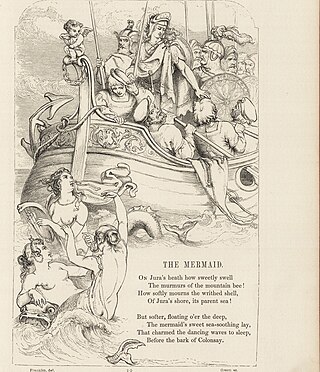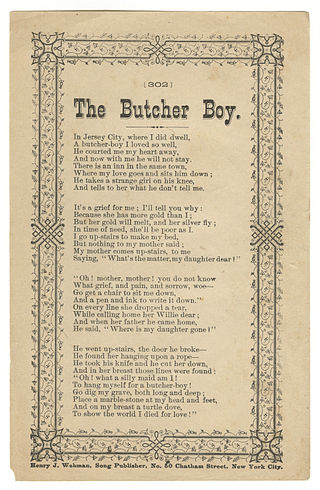"Scarborough Fair" is a traditional English ballad. The song lists a number of impossible tasks given to a former lover who lives in Scarborough, North Yorkshire. The "Scarborough/Whittingham Fair" variant was most common in Yorkshire and Northumbria, where it was sung to various melodies, often using Dorian mode, with refrains resembling "parsley, sage, rosemary and thyme" and "Then she'll be a true love of mine." It appears in Traditional Tunes (1891) by Frank Kidson, who claims to have collected it from Whitby.

"Barbara Allen" is a traditional folk song that is popular throughout the English-speaking world and beyond. It tells of how the eponymous character denies a dying man's love, then dies of grief soon after his untimely death.

The Child Ballads are 305 traditional ballads from England and Scotland, and their American variants, anthologized by Francis James Child during the second half of the 19th century. Their lyrics and Child's studies of them were published as The English and Scottish Popular Ballads. The tunes of most of the ballads were collected and published by Bertrand Harris Bronson in and around the 1960s.
"Frog Went a-Courtin'" is an English-language folk song. Its first known appearance is in Wedderburn's Complaynt of Scotland (1549) under the name "The Frog cam to the Myl dur", though this is in Scots rather than English. There is a reference in the London Company of Stationers' Register of 1580 to "A Moste Strange Weddinge of the Frogge and the Mouse." There are many texts of the ballad; however the oldest known musical version is found in Thomas Ravenscroft's Melismata in 1611.

Jean Ruth Ritchie was an American folk singer, songwriter, and Appalachian dulcimer player, called by some the "Mother of Folk". In her youth she learned hundreds of folk songs in the traditional way, many of which were Appalachian variants of centuries old British and Irish songs, including dozens of Child Ballads. In adulthood, she shared these songs with wide audiences, as well as writing some of her own songs using traditional foundations.

"Matty Groves", also known as "Little Musgrave and Lady Barnard" or "Little Musgrave", is a ballad probably originating in Northern England that describes an adulterous tryst between a young man and a noblewoman that is ended when the woman's husband discovers and kills them. It is listed as Child ballad number 81 and number 52 in the Roud Folk Song Index. This song exists in many textual variants and has several variant names. The song dates to at least 1613, and under the title Little Musgrave and Lady Barnard is one of the Child ballads collected by 19th-century American scholar Francis James Child.

"The Raggle Taggle Gypsy" (Roud 1, Child 200), is a traditional folk song that originated as a Scottish border ballad, and has been popular throughout Britain, Ireland and North America. It concerns a rich lady who runs off to join the gypsies (or one gypsy). Common alternative names are "Gypsy Davy", "The Raggle Taggle Gypsies O", "The Gypsy Laddie(s)", "Black Jack David" (or "Davy") and "Seven Yellow Gypsies".
"Captain Wedderburn's Courtship" is an old Scottish ballad dating from 1785 or earlier. It is Child Ballad #46, Roud 36. It is known by a number of titles, including "Lord Roslin's Daughter" and "The Laird of Rosslyn's Daughter".

"The Mermaid" is a traditional folk ballad. Originating around the mid-18th century, this song is known by a number of names, including "Waves on the Sea", "The Stormy Winds", "Our Gallant Ship", and "The Wrecked Ship".
Willie O Winsbury is a traditional English-language folk ballad. The song, of which there are many variants, is a traditional Scottish ballad that dates from at least 1775, and is known under several other names, including "Johnnie Barbour" and "Lord Thomas of Winesberry".

"The Two Sisters" is a traditional murder ballad, dating at least as far back as the mid 17th century. The song recounts the tale of a girl drowned by her jealous sister. At least 21 English variants exist under several names, including "Minnorie" or "Binnorie", "The Cruel Sister", "The Wind and Rain", "Dreadful Wind and Rain", "The Bonny Swans" and the "Bonnie Bows of London". The ballad was collected by renowned folklorist Francis J. Child as Child Ballad 10 and is also listed in the Roud Folk Song Index. Whilst the song is thought to originate somewhere around England or Scotland, extremely similar songs have been found throughout Europe, particularly in Scandinavia.
"The Maid Freed from the Gallows" is one of many titles of a centuries-old folk song about a condemned maiden pleading for someone to buy her freedom from the executioner. Other variants and/or titles include "The Gallows Pole", "The Gallis Pole", "Anathea", "Hangman", "The Prickle-Holly Bush", "The Golden Ball", and "Hold Up Your Hand, Old Joshua She Cried." In the collection of ballads compiled by Francis James Child in the late 19th century, it is indexed as Child Ballad number 95; 11 variants, some fragmentary, are indexed as 95A to 95K. The Roud Folk Song Index identifies it as number 144.
"Geordie" is an English language folk song concerning the trial of the eponymous hero whose lover pleads for his life. It is listed as Child ballad 209 and Number 90 in the Roud Folk Song Index. The ballad was traditionally sung across the English speaking world, particularly in England, Scotland and North America, and was performed with many different melodies and lyrics. In recent times, popular versions have been performed and recorded by numerous artists and groups in different languages, mostly inspired by Joan Baez's 1962 recording based on a traditional version from Somerset, England.

"Fair Margaret and Sweet William" is a traditional English ballad which tells of two lovers, one or both of whom die from heartbreak. Thomas Percy included it in his 1765 Reliques and said that it was quoted as early as 1611 in the Knight of the Burning Pestle. In the United States, variations of Fair Margaret were regarded as folk song as early as 1823.
"Riddles Wisely Expounded" is a traditional English song, dating at least to 1450. It is Child Ballad 1 and Roud 161, and exists in several variants. The first known tune was attached to it in 1719. The title "Riddles Wisely Expounded" was given by Francis James Child and seems derived from the seventeenth century broadside version "A Noble Riddle Wisely Expounded".
"Edward" is a traditional murder ballad existing in several variants, categorised by Francis James Child as Child Ballad number 13 and listed as number 200 in the Roud Folk Song Index. The ballad, which is at least 250 years old, has been documented and recorded numerous times across the English speaking world into the twentieth century.
Nimrod Workman was an American folk singer, coal miner and trade unionist. His musical repertoire included traditional English and Scottish ballads passed down through his family, Appalachian folk songs and original compositions.
"Black Is the Color (of My True Love's Hair)" (Roud 3103) is a traditional ballad folk song known in the US as associated with colonial and later music in the Appalachian Mountains. It is believed to have originated in Scotland, as it refers to the River Clyde in the lyrics. American musicologist Alan Lomax supported the thesis of Scottish origin, saying that the song was an American "re-make of British materials."

"The Butcher’s Boy" or "The Butcher Boy" is an American folk song derived from traditional English ballads. Folklorists of the early 20th century considered it to be a conglomeration of several English broadside ballads, tracing its stanzas to "Sheffield Park", "The Squire's Daughter", "A Brisk Young Soldier", "A Brisk Young Sailor" and "Sweet William " and "Died for Love".
"One Morning in May" is an English folk song which has been collected from traditional singers in England and the USA and has also been recorded by revival singers. Through the use of double-entendre, at least in the English versions, it tells of an encounter between a grenadier and a lady.









